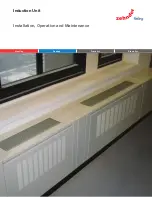
digital audio
modular
processing system
C8000
4/8/16 channels DSP with SDI & system-bus I/O
C8492(B)
page
4/30
Initial set up
ADDRESS:
This rotary encoder sets the CAN ID of the C8492. The 16 switch positions
are hexadecimal numbers (0x0 to 0xF). The CAN address also defines the
location of the module icon within the GUI overview of rows three to six.
SW1:
#1 BUS-EN
ON
= The output configuration will be taken from the NV (non volatile)
memory after power up.
OFF = will set all bus outputs to Tri-State-Mode (inactive).
Now you may use the frame controller to configure the board.
This configuration will automatically be stored into the NV memory
To enable the configuration for the next power up you must
pull out the module and set BUS-EN=ON again.
Important note! Since this type of module has an electronic output routing facility, great care must be
taken when installing or exchanging a module when such frame has components which are On Air!
If an unknown output bus configuration is stored, it can cause a conflict with other modules in the frame.
If you are not sure about the output bus configuration you must turn BUS-EN=OFF before inserting such a
module into a system that is On Air. If all settings are done remotely and the unit fits into the bus
assignment scheme of that frame, you must remove it and place the switch back into
position BUS-EN=ON to activate this setting for the next power up(s).
#2 H-CAN
OFF = CAN bus speed 256kBit/s
ON = CAN bus speed 1Mbit/s
Important Note! For a limited number of modules like the C8492 it is possible to communicate with a
CAN bus speed of 1MBit/s. This provides more bandwidth to move measuring data from the module via
the frame controller to the J*AM based loudness logger. Be sure that all modules within a frame are
operating with the same CAN bus speed.
#3
OFF = Internal use and must be set to OFF.
#4 ID +16
OFF = CAN bus address range is standard (counting from 0x0 to 0xF)
see rotary encoder settings above.
ON
= CAN bus address range is extended by +16
(counting from 0x10 to 0x1F).
#5 MASTER
OFF = Sync is taken from the c8k frame.
ON
= The C8492(B) is sync master for the frame.
Sync is derived from the SDI input.
Both settings are only valid if the Bus Access feature is enabled!
#6
OFF = Internal use and must be set to OFF.
INIT
Pressing the INIT button during power up will initialize the module
parameters to factory default values.
General Remark! The C8492 is a 16 channel device from the SDI de-embedding / embedding point of
view but the number of audio processing channels may be different. Four channels are standard while
eight or 16 channels are an option. Since the parameters are similar, this document describes the
16 channel processor version. The difference will be the number of fail-over circuits (one for the 4ch, two
for the 8ch and four for the 16ch option).





































